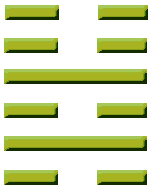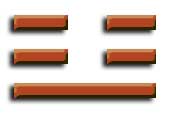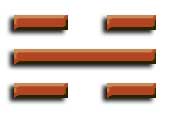
I Ching Hexagram nr. 40
|
Xiè or Hsieh – Taking-Apart, deliverance, untangled |
|
 Øverst |
Trigram: Chên The Arousing, Thunder |
 Nederst |
Trigram: K’an The Abysmal, Water |
Beskrivelse af billedet:
Torden og regn sat i: Billedet af udfrielse. Således den overlegne mand tilgiver fejl og tilgiver ugerninger.
En tordenvejr har den virkning, rense luften; den overlegne mand frembringer en lignende effekt, når der beskæftiger sig med fejl og synder mænd, der inducerer en tilstand af spænding. Gennem klarhed han bringer befrielse. Men når mangler kommet frem, at han ikke dvæle ved dem; han blot passerer over fejl, de utilsigtede overtrædelser, ligesom torden dør væk. Han tilgiver ugerninger, de forsætlige overtrædelser, ligesom vandet skyller alt ren.
The Image
Thunder and rain set in: The image of DELIVERANCE. Thus the superior man pardons mistakes And forgives misdeeds.
A thunderstorm has the effect of clearing the air; the superior man produces a similar effect when dealing with mistakes and sins of men that induce a condition of tension. Through clarity he brings deliverance. However, when failings come to light, he does not dwell on them; he simply passes over mistakes, the unintentional transgressions, just as thunder dies away. He forgives misdeeds, the intentional transgressions, just as water washes everything clean.
I Ching helt enkeltHexagram nr. 40Hexagrammet Hsieh signalerer starten på en udfrielse af fare, spændinger og vanskeligheder. Her instruerer I Ching dig både om befrielsens årsag, og hvordan du må handle for at drage fuld nytte af den. Befrielsen skyldes altid en ændring af vores indstilling. Den Højere Magt bruger konflikter og forhindringer til at give os de lektioner, vi nægter at lære på lettere vis, men indtil vi har erkendt, hvori lektien består, formørker det blot udsigten for os. Så længe vi enten ignorerer eller gør modstand mod vanskeligheder, vil de være vore konstante rejsekammerater – så såre vi accepterer deres tilstedeværelse som et tegn på, at en vis selvkorrektion er påkrævet, starter vores befrielse. Den eneste måde at fordrive problemer og opnå ro i sjælen på, er at ændre vores indstilling. I Ching lærer os også, at vi får forskellige ansvar at opfylde, når først vor befrielse begynder. Det første består i at tilgive andres ugerninger. Dette hexagrams billede viser et voldsomt, regnfyldt uvejr, som vasker det urene bort. Dette er da tiden til at begynde på en frisk og møde andre på halvvejen med mildhed og tålmodighed. Dernæst rådes vi til at genoprette vor indre balance og se til, at den opretholdes. Befrielsen giver os mulighed for at vende tilbage til sindsligevægten, og vi må benytte os af lejligheden samvittighedsfuldt. Endelig rådes vi til ikke at forsøge at fremtvinge fremgangen, selv om tiden er gunstig. Hvis vi for alvor har skiftet holdning, er vi blevet upartiske, uskyldige, beskedne og accepterende. I denne tilstand tillader vi fremgang at folde sig naturligt ud i henhold til den Vises vilje. Generelt Kassér alle møllesten du bærer rundt på. Bitterhed, forurettelse og beskyldninger vil kun holde dig tilbage. Kærlighed Lad ikke skyld og / eller gensidige beskyldninger komme i vejen for dit forhold til din partner. Forretning Dette er en tid til at tage meget små skridt fremad. Personligt Tidligere problemer bør glemmes, så du kan begynde at gøre fremskridt igen. |
| Kommentar
From the book I Ching. Here the movement goes out of the sphere of danger. The obstacle has been removed, the difficulties are being resolved. Deliverance is not yet achieved; it is just in its beginning, and the hexagram represents its various stages. |
| Her bevægelsen går ud af området for fare. Den forhindring er fjernet, de vanskeligheder at blive løst. Deliverance er endnu ikke nået; det er bare i sin begyndelse, og det hexagram repræsenterer de forskellige stadier. |
Nederste linje
Six at the beginning means: Without blame.
In keeping with the situation, few words are needed. The hindrance is past, deliverance has come. One recuperates in peace and keeps still. This is the right thing to do in times when difficulties have been overcome.
tekst
Linje 2
Nine in the second place means: One kills three foxes in the field And receives a yellow arrow.Perseverance brings good fortune.
The image is taken from the hunt. The hunter catches three cunning foxes and receives a yellow arrow as a reward. The obstacles in public life are the designing foxes who try to influence the ruler through flattery. They must be removed before there can be any deliverance. But the struggle must not be carried on with the wrong weapons. The yellow color points to measure and mean in proceeding against the enemy; the arrow signifies the straight course. If one devotes himself wholeheartedly to the task of deliverance, he develops so much inner strength from his rectitude that it acts as a weapon against all that is false and low.
tekst
Linje 3
Six in the third place means:If a man carries a burden on his back And nonetheless rides in a carriage, He thereby encourages robbers to draw near. Perseverance leads to humiliation.
This refers to a man who has come out of needy circumstances in to comfort and freedom from want. If now, in the manner of an upstart, he tries to take his ease in comfortable surroundings that do not suit his nature, he thereby attracts robbers. If he goes on thus he is sure to bring disgrace upon himself. Confucius says about this line:
Carrying a burden on the back is the business of common man; a carriage is the appurtenance of a man of rank. Now, when a common man uses the appurtenance of man of rank, robbers plot to take it away from him. If a man is insolent toward those above him and hard toward those below him, robbers plot to attack him. Carelessness in guarding things tempts thieves to steal. Sumptuous ornaments worn by a maiden are an enticement to rob her of her virtue.
tekst
Linje 4
Nine in the fourth place means: Deliver yourself from your great toe. Then the companion comes, And him you can trust.
In times of standstill it will happen that inferior people attach themselves to a superior man, and through force of daily habit they may grow very close to him and become indispensable, just as the big toe is indispensable to the foot because it makes walking easier. But when the time of deliverance draws near, with its call to deeds, a man must free himself from such chance acquaintances with whim he has no inner connection. For otherwise the friends who share his views, on whom he could really rely and together with whom he could accomplish something, mistrust him and stay away.
tekst
Linje 5
Six in the fifth place means: If only the superior man can deliver himself, It brings good fortune. Thus he proves to inferior men that he is in earnest.
Times of deliverance demand inner resolve. Inferior people cannot be driven off by prohibitions or any external means. If one desires to be rid of them, he must first break completely with them in his own mind; they will see for themselves that he is in earnest and will withdraw.
tekst
Øverste linje
Six at the top means: The prince shoots at a hawk on a high wall. He kills it. Everything serves to further.
The hawk on a high wall is the symbol of a powerful inferior in a high position who is hindering the deliverance. He withstands the force of inner influences, because he is hardened in his wickedness. He must be forcibly removed, and this requires appropriate means. Confucius says about this line:
The hawk is the object of the hunt; bow and arrow are the tools and means. The marksman is man (who must make proper use of the means to his end). The superior man contains the means in his own person. He bides his time and then acts. Why then should not everything go well? He acts and is free. Therefore all he has to do is to go forth, and he takes his quarry. This is how a man fares who acts after he has made ready the means.
tekst
Stil spørgsmål om I Ching
Stil lige så mange spørgsmål du har lyst til om I Ching
Det er gratis og nemt – Stil et spørgsmål
| Chien | Tui | Li | Chên | Sun | K’an | Kên | K’un | |
